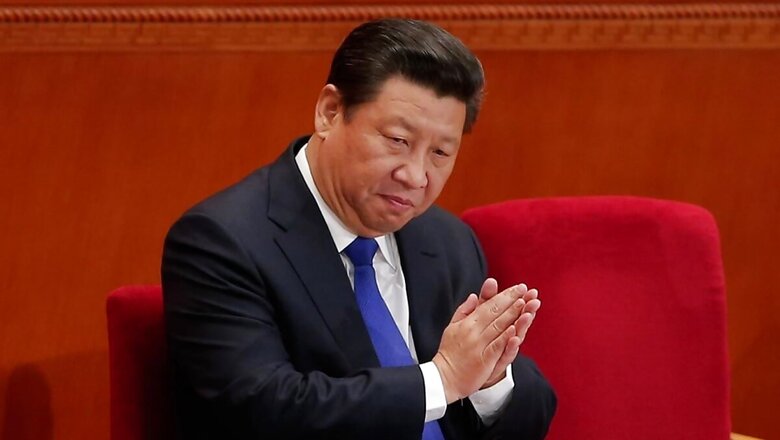
views
Twenty four Chinese state-owned enterprises were added to the Entity List by the US Department of Commerce on Wednesday. This list now includes China Communications Construction Company (CCCC) and some of its subsidiaries. The reason cited for the licensing restrictions by the US State Department is that the company indulged in malign activities in the South China Sea.
Secretary of State Mike Pompeo said, “CCCC led the destructive dredging of the PRC’s South China Sea outposts and is also one of the leading contractors used by Beijing in its global ‘One Belt One Road’ strategy. CCCC and its subsidiaries have engaged in corruption, predatory financing, environmental destruction, and other abuses across the world.”
The move has drawn a sharp reaction from Beijing, with the Chinese foreign ministry spokesperson Zhao Lijian saying that “China will take firm measures to resolutely safeguard the legitimate interests of domestic enterprises and individuals.” He also added that “the US action has grossly interfered in China’s internal affairs, violated international law and basic norms of international relations, and is completely hegemonic and power politics. China firmly opposes this.”
The reaction is sharp because it is clear that subjecting CCCC to specific license requirements for the export, re-export and transfer of specified items could also hit China where it hurts most – the Belt and Road Initiative (BRI). Strategic analyst Brahma Chellany told News18.com, “This could have a bearing on BRI projects because Washington DC could exert pressure on other countries not to deal with the sanctions-hit Chinese companies.”
Often cited as Xi Jinping’s signature initiative, the BRI, which was earlier called One Belt One Road, was conceived in 2013. In the 40th year of Reform and Development in 2018, it was the BRI that was projected as being at the forefront of the change that the Xi regime would bring about in China since 1978.
But by then concerns about the BRI were already emerging. India rejected attending the first BRI summit in 2017 a night before the event in Beijing citing a strong objection to the flagship project under BRI, the China-Pakistan Economic Corridor (CPEC). Spokesperson for the Ministry of External Affairs said, “No country can accept a project that ignores its core concerns on sovereignty and territorial integrity.” CPEC passes through Pakistan Occupied Kashmir.
Strategic analysts are of the opinion that China is passing off these projects as infrastructure development initiatives that will benefit the host country but are indeed nothing but strategic assets. The risk of many of the countries being caught in a debt trap is now most real.
In fact, the US China Economic and Security Review Commission in 2018 had also raised some red flags clearly stating that “strategic interests are central to BRI, even though the Chinese government denies that BRI advances its geopolitical ambitions.”
It had also said that “despite Beijing’s rhetoric about BRI being open and inclusive, Chinese state-owned enterprises are winning the lion’s share of contracts for BRI projects.” The CCCC being one of the biggest beneficiaries, as is stated now in the state department release.
As per details on its own website, the CCCC is the “largest port construction and design company in China, a leading company in road and bridge construction and design, a leading railway construction company, the largest dredging company in China and the second largest dredging company (in terms of dredging capacity) in the world.”
From the Gwadar deep water port in Pakistan to a port city project in Colombo, the CCCC has several strategic overseas projects around India and the Indo-Pacific region.
In fact, apart from the US even the Australian federal government is set to pass a legislation next week that can scrap any agreements by state governments with a foreign country. The Victoria government has signed on a project under the BRI last year and it is largely believed that the Scott Morison government will use the legislation to scrap that project or any other to weaken China’s BRI move in Australia.
The Australian govt press release said, “Under the reforms, the Foreign Minister will have the power to review any existing and prospective arrangements between state and territory governments and all foreign governments. Arrangements that adversely affect Australia’s foreign relations or are inconsistent with our foreign policy could be prevented from proceeding or terminated.”
Reacting to the news, Chinese foreign ministry spokesperson Zhao Lijian said, “The Australian side should treat China-Australia cooperation and the “Belt and Road” initiative in an objective and rational manner, and not create artificial obstacles to normal exchanges and cooperation between China and Australia.”
Apart from concerns of security in Indo-Pacific vis-à-vis China, Australia has been locked in a feud with Beijing ever since it moved a resolution in the World Health Organisation in March along with EU to seek a probe into the origin of the Novel Coronavirus that has caused the COVID-19 pandemic.
Taking all this as a direct affront, the Chinese government in retaliation slapped trade restrictions announcing tariffs on barley and banning beef import from some Australian firms. China is Australia’s biggest trading partner and it used the platform to hit back at them. Meanwhile as part of the Five Eyes intelligence sharing group, Australia has also banned Huawei from participating in its 5G network.
Former Indian diplomat and one who served as India’s ambassador in one of the Five Eye countries Canada, Vishnu Prakash also believes that these decisions with regards to BRI could be significant. He told News18.com, “After turning a Nelson’s eye for many years, the US secretary of State termed Chinese claims on South China Sea as ‘completely unlawful’. The recent decision to place 24 Chinese companies, mostly state owned enterprises, including the massive CCCC in the entities list, is a logical step forward. These companies have been serving as the implementation arm both in South China Sea and BRI. If nothing else it would certainly act as a speed bump in Chinese ambition of global dominance.”
A possible squeeze on Xi Jinping’s pet project, Belt and Road Initiative, has for now only drawn a sharp reaction but the sheer significance of the move is unlikely to allow Beijing to sit still as it has the potential to prevent it from looking out for bigger emerging markets for trade and expanding its military reach and geopolitical influence.




















Comments
0 comment